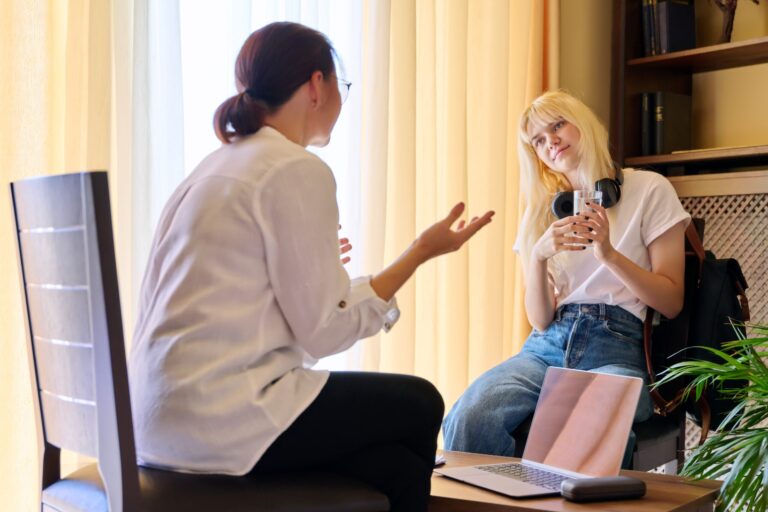Dr. Google. Oh, how we depend on him. Oh, how damaging she can be, although it’s true that Dr. Google can be helpful, too. For anyone who’s ever stayed up all night cross-checking symptoms from something as mild as the common cold only to lose sleep convinced they’ve got a terminal illness, you already know some of the the pros and cons of using Dr. Google.
If you’ve ever found yourself playing doctor while you waited for your real life doctor or pediatrician’s office to open, you’re far from alone. While you may or may not know, there are pros and cons to consulting first with Dr. Google. To find out what they are, read on.
Why Dr. Google is Great

Dr. Google may not, ultimately, be our very best symptom checker, but the internet’s biggest search engine can still serve its purposes when it comes to providing health information. For starters, Dr. Google’s always around. Whether it’s the middle of the night or just after the doctor’s office closes, Dr. Google is only a few key strokes away. Instead of an expensive trip to the emergency room, Dr. Google can help take fears away.
There are some ways Dr. Google can serve as a friend no matter what your symptoms. Advising you of when to go to the emergency room immediately because of a possible serious condition is the first of these. Talking you through phases of labor and knowing when to go to the hospital or a clinic is another important way the internet can be helpful, as well as validating information your real life doctor gave you, serving as a tool for resources like how to talk to your doctor and how to get a second opinion. These are also fantastic ways to use Dr. Google for help.
When in doubt, Dr. Google is great for helping you to locate support groups after a proper diagnosis or to find health care and treatment options in your area. The web can also help you find financial advisors who can guide you in the event of big medical expenses. Telling you when a minor symptom is normal and not something to worry about and saving you from seeking costly medical advice, teaching you about home remedies and alternative methods of treatment or care, or making you question your real life doctors and medical professionals are all great ways to use online research. The internet can encourage you to advocate for yourself and offer solutions for minor medical situations as well.
Why Dr. Google is Not So Great

If you suffer from anxiety or are a self-diagnosed hypochondriac, you already know the cons of consulting Dr. Google. For you, what starts off as a real life tickle in your throat could quickly become a stage four throat cancer diagnosis if you spend too long hunting around for all the things that could possibly be wrong.
Maybe your hearing doesn’t seem quite right. Instead of putting in the keywords ‘USA hearing aids,’ you opt for ‘loss of hearing’ or ‘acute hearing loss.’ Dr. Google won’t think to ask about the last time you changed the batteries in your hearing aid. He won’t know how old or new they are either. Dr. Google won’t be able to tell you how to clean them or even offer to tune them up. Instead, Dr. Google may just leave you convinced you’ll be fully deaf by next month is you rely solely on her.
There are some ways Dr. Google can keep you awake at night for no reason or worse. Giving you anxiety, which is way more than you bargained for when logging in for informational purposes, causing you to ruminate about worst case scenarios, sending you down rabbit holes that don’t apply to your situation, leading you to YouTube videos with worst case outcomes, and making you question your real life doctors are just a few of these. Dr. Google can also be known for giving you the wrong information or bad research, causing you to lose hope with statistics that might not apply to you or don’t take into account your unique circumstances and overall health, making you doubt and question yourself, offering bad solutions that lead to worse outcomes, causing you to believe you’re fine when you’re not, leading to a decision not to see a real life doctor when you actually need one, and even triggering acute illness anxiety disorder.
Second Opinions

No amount of artificial intelligence or the world wide web’s best search engines will ever be able to compare with an in person physical exam. While real life doctors are only human and make mistakes, they have the benefit of being able to touch and see you. This is something Dr. Google currently lacks.
Like most things, the answer is probably somewhere in the middle. While Dr. Google can be a helpful tool, she can be harmful, too. It may be better to spend your late night, sleepless internet research hours reading medical articles about Vivek Ramaswamy and his efforts to get the private sector involved in COVID-19 vaccines.
Maybe instead of pondering whether you’re using symptom checkers correctly, the true answer is balance. Use Dr. Google to get an idea of what your symptoms may be causing, but always get a second opinion at an appointment with a human doctor.
Another idea of how to use the web to empower you as a patient is turning to Dr. Google for follow up questions or even to build lists of more questions, instead of making the second opinions come from the in-person doctors. In that way, Dr. Google can be both a comfort and helpful advocate in encouraging you to take first steps in lifestyle changes and more.
There are plenty of ways to find balance between in-person doctor visits and using a symptom checker to get medical advice. The first step is to understand that neither way is perfect, and that both can be useful in putting your health as your top priority.












